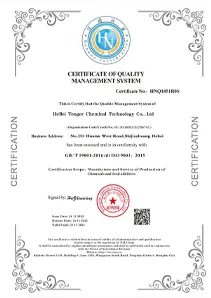
Aluminum Hydroxide Use in Feline Care and Health Management
Understanding Aluminum Hydroxide for Cats
Aluminum hydroxide is a compound that is often discussed in veterinary medicine, particularly concerning its applications in managing certain conditions in cats. This substance comes in a fine white powder and is commonly used as an antacid and phosphate binder. While aluminum hydroxide has shown efficacy in various medical settings, pet owners must be informed about its implications, especially when considering it for their feline companions.
What is Aluminum Hydroxide?
Aluminum hydroxide is a chemical compound comprising aluminum and hydroxide ions. It is typically utilized in veterinary medicine to manage gastrointestinal issues and to control phosphate levels in cats suffering from conditions like chronic kidney disease (CKD). Cats with CKD often experience elevated phosphorus levels because their kidneys are less effective in filtering waste. By binding to the phosphorus in the intestines, aluminum hydroxide helps facilitate its excretion, thereby helping to manage the hyperphosphatemia associated with this disease.
When is Aluminum Hydroxide Used in Cats?
Veterinarians frequently prescribe aluminum hydroxide for cats facing kidney issues. In these cases, the medication can improve calcium-to-phosphorus ratios, which are crucial for maintaining bone health and overall metabolic balance. In particular, cats suffering from CKD may benefit significantly from the use of aluminum hydroxide as part of a comprehensive treatment plan.
In addition to kidney issues, some veterinarians may recommend aluminum hydroxide for cats experiencing hyperacidity in their stomachs or other gastrointestinal disturbances
. The antacid properties of aluminum hydroxide can help alleviate discomfort associated with acid reflux or ulcers.Dosage and Administration
aluminum hydroxide for cats

When administering aluminum hydroxide to cats, it's crucial to follow a veterinarian's instructions precisely. The dosage can vary based on the cat's weight, health condition, and the specific issue being treated. Typically, aluminum hydroxide is given orally, either in the form of a suspension or tablet. It’s usually recommended to administer it with food to enhance its effectiveness and minimize gastrointestinal side effects.
Pet owners should ensure that the cat consumes the entire dose. If a dose is missed, the owner should administer it as soon as possible unless it’s almost time for the next dose. In such cases, skipping the missed dose and continuing with the regular schedule is advisable.
Potential Side Effects
While aluminum hydroxide is generally well-tolerated, some side effects may manifest in certain cats. Commonly observed side effects include constipation, as aluminum can slow down bowel movements. In some rare instances, an allergic reaction can occur, leading to symptoms like lethargy, swelling, or difficulty breathing. If any of these severe reactions occur, it is imperative to seek veterinary assistance immediately.
Another consideration for cat owners is the potential interaction of aluminum hydroxide with other medications. For instance, it can affect the absorption of certain drugs, making it essential to inform the veterinarian about any other medications or supplements the cat may be taking.
Conclusion
Aluminum hydroxide can be a valuable tool in managing specific health conditions in cats, particularly those related to kidney disease and gastrointestinal issues. However, it’s vital for pet owners to use this medication under veterinary guidance, ensuring that their cat receives the appropriate dosage and that potential side effects are monitored closely. Regular check-ups and open communication with your veterinarian will help ensure that your furry friend remains healthy and happy while receiving this treatment. Always remember, informed care is the best kind of care for your beloved pets.
-
Why Glacial Acetic Acid Food Grade Is Essential in FlavorNewsMay.26,2025
-
Surging Export Growth of Food Additives in ChinaNewsMay.26,2025
-
How Ammonium Nitrate Fertilizer Boosts Crop YieldsNewsMay.26,2025
-
How 1,2,3-Benzotriazole Shields Plastics from UV DegradationNewsMay.26,2025
-
Cyanide in Gold Mining: Protecting People and the PlanetNewsMay.26,2025
-
Aluminum Hydroxide in Modern Sunscreen FormulationsNewsMay.26,2025
-
Understanding Synthetic Rubber OptionsNewsApr.27,2025
Hebei Tenger Chemical Technology Co., Ltd. focuses on the chemical industry and is committed to the export service of chemical raw materials.
-

view more DiethanolisopropanolamineIn the ever-growing field of chemical solutions, diethanolisopropanolamine (DEIPA) stands out as a versatile and important compound. Due to its unique chemical structure and properties, DEIPA is of interest to various industries including construction, personal care, and agriculture. -

view more TriisopropanolamineTriisopropanolamine (TIPA) alkanol amine substance, is a kind of alcohol amine compound with amino and alcohol hydroxyl, and because of its molecules contains both amino and hydroxyl. -

view more Tetramethyl Thiuram DisulfideTetramethyl thiuram disulfide, also known as TMTD, is a white to light-yellow powder with a distinct sulfur-like odor. It is soluble in organic solvents such as benzene, acetone, and ethyl acetate, making it highly versatile for use in different formulations. TMTD is known for its excellent vulcanization acceleration properties, which makes it a key ingredient in the production of rubber products. Additionally, it acts as an effective fungicide and bactericide, making it valuable in agricultural applications. Its high purity and stability ensure consistent performance, making it a preferred choice for manufacturers across various industries.











